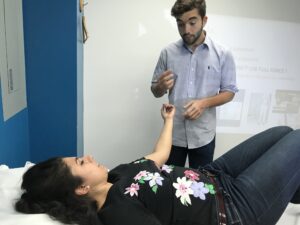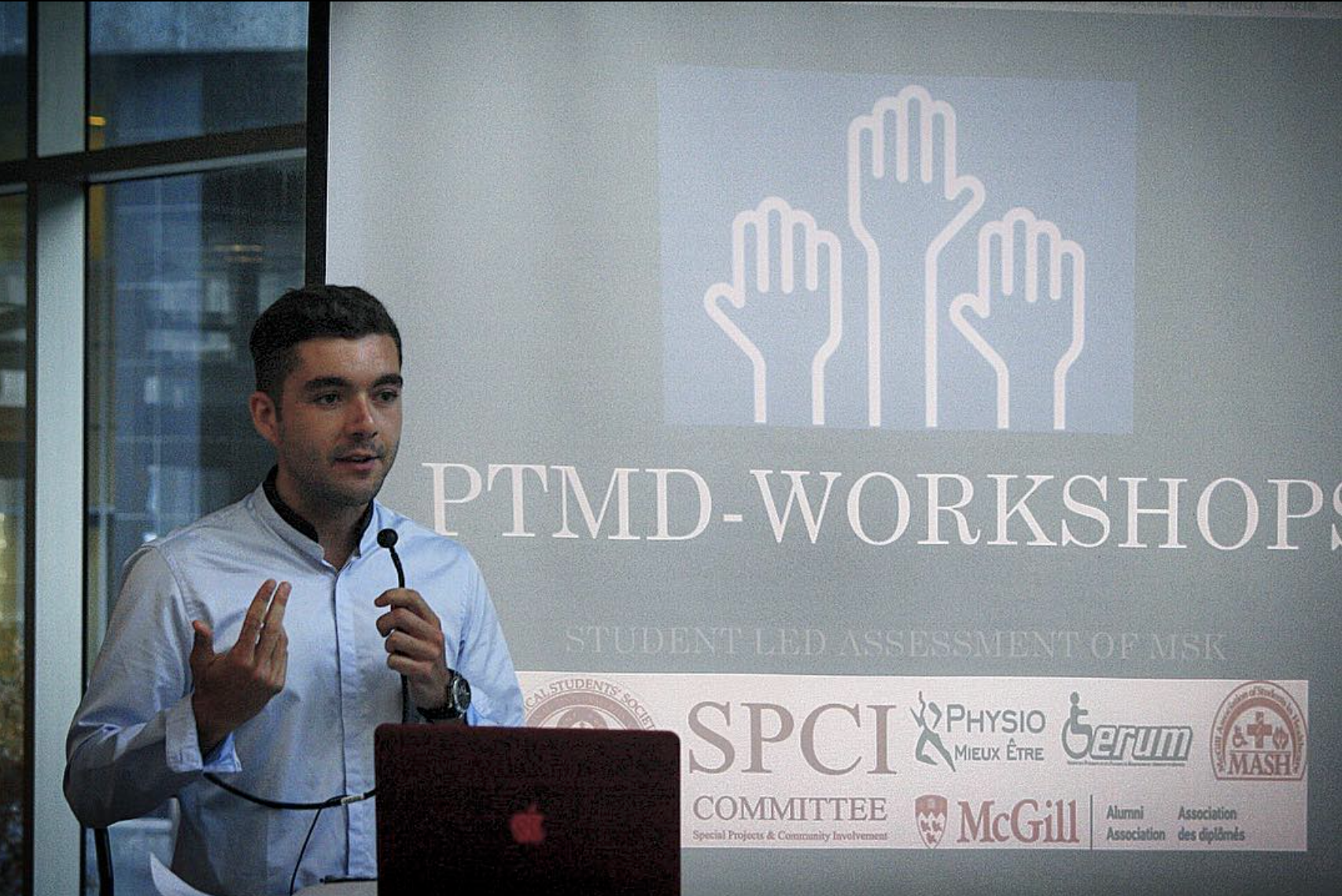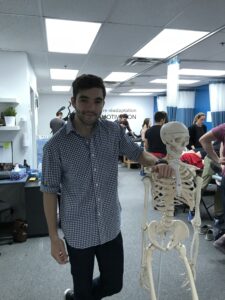Benjamin Franklin reportedly said, “If you want something done, give it to a busy person.” Cyril Boulila is busy getting things done. The second year McGill medical student works part-time as a physiotherapist, is a member of the McGill water polo team, is an award-winning saxophonist and, as if that is not enough, is developing and organizing a series of free collaborative and interprofessional workshops.
“The monthly PTMD-Workshops match Master’s-level physiotherapy (PT) students from Université de Montréal (UdeM) with McGill medical students,” says Cyril, who completed a Bachelor’s and a Master’s of Physiotherapy at UdeM before starting his MDCM at McGill. “The different workshops are designed to promote a collaborative interprofessional learning environment whereby students can interact and consolidate the theory of musculoskeletal (MSK) anatomy and practice basic assessment techniques of common MSK disorders, while also improving their understanding of appropriate patient bedside manner.’’
Each PTMD-Workshop targets a specific joint; so far, he’s organized four workshops on the shoulder, elbow, wrist and lower back. Each workshop lasts for about three hours and the material presented follows what both schools teach. Cyril and a fellow licensed physiotherapist give a 30-minute presentation on the relevant anatomy (bones, joint structure, musculature and nerves) and theory behind the assessment techniques and differential diagnoses of the joint of interest. They then provide students with demonstrations on the various assessment techniques discussed. The PT students are then paired with medical students in order to help them practice the demonstrated techniques and answer any questions, all under the supervision and assistance of licensed physiotherapists.

“Living with hemophilia and having struggled with MSK disorders in the past, I felt it was important that the students practice the techniques on each other in order to give them an idea of what it is like to be a patient, to feel vulnerable, be touched and have someone in your space. One of the goals of each workshop is to enhance students’ understanding of a patient’s perspective, which is key to creating and maintaining a trusting relationship between doctor and patient,” says Cyril.
To encourage interprofessional learning, at the end of each workshop, students enjoy pizza and beverages as well as the opportunity to socialize with their future colleagues and learn more about their respective program and clinical field. Cyril is undertaking a research project to demonstrate the benefits of interprofessional learning. “A lot of learning is done from one doctor to another, but in many domains there are professionals who are experts in their fields and they have a lot of knowledge to share,” he says.
 Wait list for workshops
Wait list for workshops These workshops are extremely successful in that, on average, there is a waitlist for each of more than 30 students. In addition, PTMD-Workshops was also selected as a Top-5 project of the year at the McGill Medical Students’ Society Special Projects and Community Involvement (SPCI) Gala 2018 and has been selected as a workshop for the Annual Family Medicine Student Symposium 2018.
Cyril has a few other courses in the development phase to broaden the interprofessional aspect of his workshops. One focuses on the temporal mandibular joint, and will team up Master’s-level physiotherapists with dentistry students. Another will target the hand assessment and will pair Master’s-level occupational therapy students with medical students. In addition, inspired by the many nurses he treated at the physiotherapy clinic, Cyril also decided to organize a workshop that involves nursing and occupational therapy students and that focuses on teaching and practicing safe bed to chair transfer techniques in order to help prevent occupational work injuries.
Asked how he balances doing an MDCM, working part-time, being on the water polo team, playing sax and developing and organizing these workshops Cyril says, “This is my passion, it’s important for me to make time to do what I love. I want to make a positive change in the care we provide patients with musculoskeletal disorders. These disorders account for nearly 30 percent of clinical encounters in the primary health care setting. “As a physician, you help patients achieve a longer life. As a physiotherapist, you help patients regain their function, giving quality of life to those extra years. I aspire to be the kind of doctor that is able to do both.”
Cyril will be giving his next PTMD-Workshops during the upcoming Family Medicine Student Symposium 2018, where he will be teaching the basics about the knee joint, from assessment to treatment!
To find out more about upcoming PTMD-Workshops and to register go to: www.facebook.com/PTMD2021/
September 20, 2018

